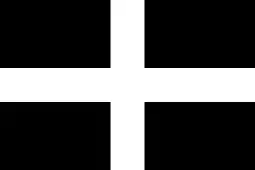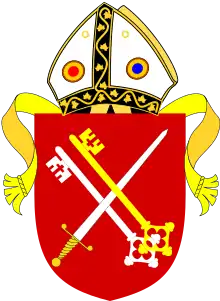Sir Jonathan Trelawny, 3rd Baronet
Sir Jonathan Trelawny, 3rd Baronet (24 March 1650 – 19 July 1721) was a British Bishop of Bristol, Bishop of Exeter and Bishop of Winchester. Trelawny is best known for his role in the events leading up to the Glorious Revolution which are sometimes believed to be referenced in the Cornish anthem The Song of the Western Men.
Sir Jonathan Trelawny | |
|---|---|
| Bishop of Winchester | |
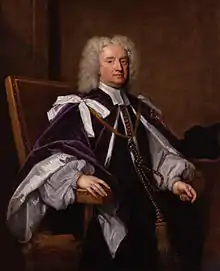 1720 | |
| Church | Church of England |
| Diocese | Winchester |
| In office | 1707–1721 |
| Predecessor | Peter Mews |
| Successor | Charles Trimnell |
| Orders | |
| Consecration | 8 November 1685 by William Sancroft |
| Personal details | |
| Born | 24 March 1650 Trelawne, Cornwall, England |
| Died | 19 July 1721 (aged 71) Chelsea, Middlesex, England |
| Nationality | Cornish |
| Denomination | Anglican |
| Previous post | Bishop of Bristol (1685–1689) Bishop of Exeter (1689–1707) |
| Education | Westminster School |
| Alma mater | Christ Church, Oxford |
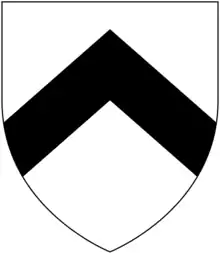
Life
He was born at Trelawne in the parish of Pelynt, Cornwall, the eldest surviving son of Sir Jonathan Trelawny, 2nd Baronet. He was educated at Westminster School and then went to Christ Church, Oxford at the start of the Michaelmas term of 1668 where he distinguished himself as a scholar.
A staunch royalist, he was ordained in 1673 and became a beneficed clergyman. He was appointed rector of South Hill on 4 October and of St. Ives on 12 December 1677, becoming Bishop of Bristol in 1685. He was one of the Seven Bishops tried for seditious libel under James II. Trelawny and the other bishops petitioned against James II's Declaration of Indulgence in 1687 and 1688, (granting religious tolerance to Catholics) and as a result he was arrested and imprisoned in the Tower of London on charges of seditious libel. The bishops said that whilst they were loyal to King James II, their consciences would not agree to allowing freedom of worship to Catholics even if it were to be within the privacy of their own homes as the Declaration proposed; thus they could not sign. Trelawny was held for three weeks before trial, then tried and acquitted; this led to great celebrations, with bells being rung in his home parish of Pelynt.[1]
Trelawny was rewarded in 1689 by being appointed Bishop of Exeter (whilst still, until 1694, Archdeacon of Totnes) after the military defeat of James II and the accession of the Protestant William of Orange to the British throne. He was further rewarded by being appointed Bishop of Winchester in 1707, although his promotion was a matter of some controversy, as Queen Anne, who was determined to keep all important Church appointments within her own gift, overruled the advice of her ministers and of Thomas Tenison, the Archbishop of Canterbury in appointing him, thus provoking the so-called Bishoprics Crisis. He died in 1721, in Chelsea, Middlesex; his body was taken back to Pelynt for burial.
Family
He married Rebecca Hele, by whom he had twelve children:[2][3][4]
- Charlotte Trelawny (1687/8 – aft. 1745), unmarried
- Letitia Trelawny (b. 1689), married Sir Harry Trelawny, 5th Baronet
- Sir John Trelawny, 4th Baronet (1691–1756)
- Henry Trelawny (1692–1707), fought in the War of the Spanish Succession and died with Admiral Sir Cloudesley Shovell aboard HMS Association during the Scilly naval disaster of 1707.[5]
- Charles Trelawny (1694 – 24 August 1721), without issue, prebendary of Westminster
- Rebecca Trelawny (1696–1743), married John Francis Buller in 1716
- Elizabeth Trelawny (1697 – 25 January 1744), married Rev. George Allanson (d. 1741), Archdeacon of Cornwall
- Edward Trelawny (1699–1754), became governor of Jamaica
- Mary Trelawny (b. 1700), died in infancy
- Rev. Hele Trelawny (1703–1740), without issue
- Jonathan Trelawny (b. 1705), died in infancy
- Anne Trelawny (1707–1745), unmarried
Reputation
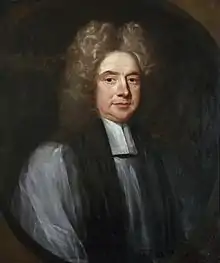
It is sometimes suggested that Bishop Trelawny was immortalised in the Cornish Anthem, The Song of the Western Men, better known simply as Trelawny, written over a century later and composed by Parson Robert Stephen Hawker, vicar of Morwenstow.
- And shall Trelawny live?
- Or shall Trelawny die!
- Here's twenty thousand Cornish men
- Will know the reason why![1]
Notes
- Chisholm 1911.
- Kimber, Edward; Johnson, Richard; Wotton, Thomas (1771). The Baronetage of England. G. Woodfall. p. 311. Retrieved 2 August 2007.
- Vivian, John Lambrick (1887). The Visitation of Cornwall. pp. 477–478.
- Debrett, John (1835). Debrett's Baronetage of England. p. 42.
- James Herbert Cooke, The Shipwreck of Sir Cloudesley Shovell on the Scilly Islands in 1707, From Original and Contemporary Documents Hitherto Unpublished, Read at a Meeting of the Society of Antiquaries, London, 1 Feb. 1883
References
 This article incorporates text from a publication now in the public domain: Chisholm, Hugh, ed. (1911). "Trelawny, Sir Jonathan". Encyclopædia Britannica. 27 (11th ed.). Cambridge University Press.
This article incorporates text from a publication now in the public domain: Chisholm, Hugh, ed. (1911). "Trelawny, Sir Jonathan". Encyclopædia Britannica. 27 (11th ed.). Cambridge University Press.- Twemlow, Jesse Alfred (1899). . In Lee, Sidney (ed.). Dictionary of National Biography. 57. London: Smith, Elder & Co.
- Coleby, Andrew M. "Trelawny, Sir Jonathan, third baronet (1650–1721)". Oxford Dictionary of National Biography (online ed.). Oxford University Press. doi:10.1093/ref:odnb/27689. (Subscription or UK public library membership required.)
External links
- Who was Trelawny? by Tom Prout, Editor of the Trelawny's Army Newsletter.
| Church of England titles | ||
|---|---|---|
| Preceded by John Lake |
Bishop of Bristol 1685–1689 |
Succeeded by Gilbert Ironside |
| Preceded by Thomas Lamplugh |
Bishop of Exeter 1689–1707 |
Succeeded by Ofspring Blackall |
| Preceded by Peter Mews |
Bishop of Winchester 1707–1721 |
Succeeded by Charles Trimnell |
| Honorary titles | ||
| Preceded by John Trelawny |
Vice-Admiral of South Cornwall 1682–1693 |
Succeeded by Henry Trelawny |
| Baronetage of England | ||
| Preceded by Jonathan Trelawny |
Baronet (of Trelawney) 1681–1721 |
Succeeded by John Trelawny |
